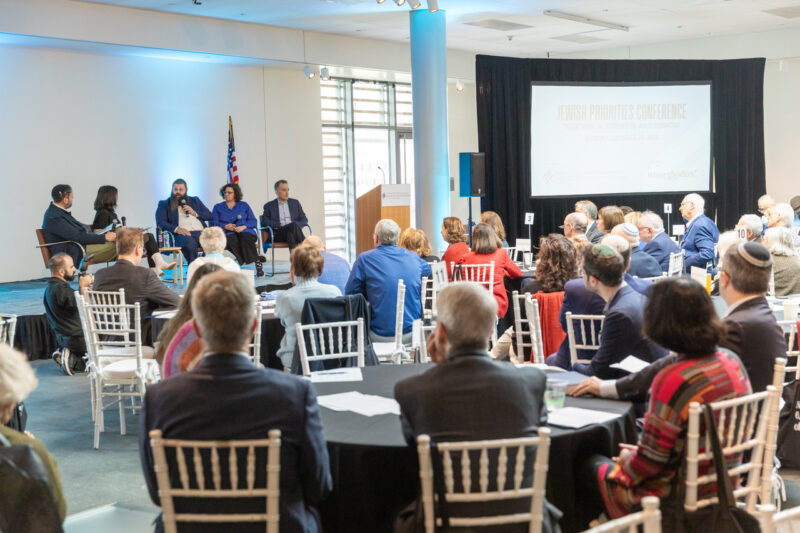New realities
Oct. 7 attacks become top Jewish priority at Weitzman museum conference
Event that was meant to focus on newly released collection of essays Jewish Priorities gets new theme, ‘Together in Strength and Sorrow,’ in light of war in Israel

Courtesy/Christopher Brown
Panelists speak at the 'Jewish Priorities Conference,' which was held at the Weitzman National Museum of American Jewish History in Philadelphia on Oct. 22, 2023.
The Weitzman National Museum of American Jewish History in Philadelphia had been organizing its Jewish Priorities Conference for months, bringing together prominent Jewish voices to discuss the leading issues and challenges facing the American and global Jewish community today. But the massacres in southern Israel on Oct. 7 forced the organizers to rapidly pivot; surely responding to the deadliest event since the Holocaust is a Jewish priority.
The event, held on Sunday, was refocused and given a new theme: “Together in Strength and Sorrow.” The organizers also invited Natalie Sanandaji, a survivor of the attack at the Nova music festival in southern Israel, in which at least 260 people were killed, to speak about her experience.
The Jewish Priorities Conference was held “in conjunction with and… inspired by” a newly released collection of essays of the same name (Jewish Priorities: Sixty-Five Proposals for the Future of Our People) that was edited by David Hazony, who spoke at the event, the organizers said. The conference was funded by Philip M. Darivoff and the Steinhardt Foundation.
The conference featured five panels throughout the day. Few attendees were under the age of 50, and those that were were mostly the children of panelists, leading to concerns among some attendees that an entire generation was absent from discussing Jewish priorities. The panelists — save for Sanandaji — were well-known figures in the Jewish world with large followings and ready access to platforms.
Speaking through a video conference, Sanandaji, 28, told the conference that she was visiting Israel for a friend’s wedding when she decided to attend the music festival outside Kibbutz Reim near the Gaza border, which became the site of Israel’s single deadliest attack on civilians in its history. She recalled spending four hours running through the desert with friends, away from Hamas, before being rescued.
A Long Island native, Sanandaji has since returned to New York. But she doesn’t feel much safer. “It’s hard to grasp. I ran from rockets and from being shot at and then I come back home and still feel attacked, in a different way,” Sanandaji told eJewishPhilanthropy in an interview following her appearance at the conference. Sanandaji pointed to antisemitism surging around the world in the wake of the Israel-Hamas war. The New York Police Department reported 20 anti-Jewish hate crimes in a one-week period ending Sunday.
“The Jewish people were attacked and now we’re being attacked in different ways all over the world because we were attacked,” she continued, adding that the best way for American Jews to support Israel right now is to “speak out.”
“I don’t feel safe but I’m still here speaking out,” Sanandaji, who noted that she never experienced antisemitism while growing up in New York, said. “If we don’t, we let them win. Be strong and proud of your Judaism.”
Hazony echoed Sanandaji, saying that coming from Israel to the U.S. has not provided relief from the war that he thought it would.
“I expected to come to a nation completely disconnected from the hell I experienced for two weeks,” Hazony said. “Instead [I’m seeing] something different, maybe worse, I don’t know. America is also preoccupied with the hell I’ve been going through the last two weeks.”
Yosef Abramowitz, a green energy evangelist and a member of Israeli President Herzog’s Climate Forum; authors Roya Hakakian and Tal Keinan; and Andrés Spokoiny, CEO of the Jewish Funders Network, appeared on a panel titled “We’re Just Getting Started” about the role of civil society.
Spokoiny asked an open question during the panel: “Should we spend any time, money and effort into trying to change hearts and minds of people who weren’t already convinced by the images of the Oct. 7 terrorist attack?”
Speaking to eJewishPhilanthropy after the conference, Spokoiny said the Jewish community has to prioritize its efforts on this front. “There’s skepticism about who we are trying to convince. On the one hand, Israel received a lot of solidarity; for example, world leaders are coming to Israel in the middle of a war, which is unprecedented.
“On the other hand,” he continued, “the level of antisemitic vitriol is also unprecedented. Strategically where do we focus our efforts? Strengthen our allies and educate those that can be educated. Then there are those that you don’t try to convince.”
Spokoiny outlined concrete steps funders can take amid the crisis in Israel.
“There’s a silver lining of sorts,” he told eJP. “Many Jewish funders see… there’s a lot they can do to help Jewish community.”
Discussing the growing numbers of donors pulling their funding for universities and other institutions that have failed to unequivocally condemn the Oct. 7 attacks or justified them, Spokoiny said that’s not enough.
“Let’s follow up a ‘no’ with a ‘yes,’” he said. “For example, not funding a university that doesn’t stand up for antisemitism is good… funding an Israeli university is even better.”












